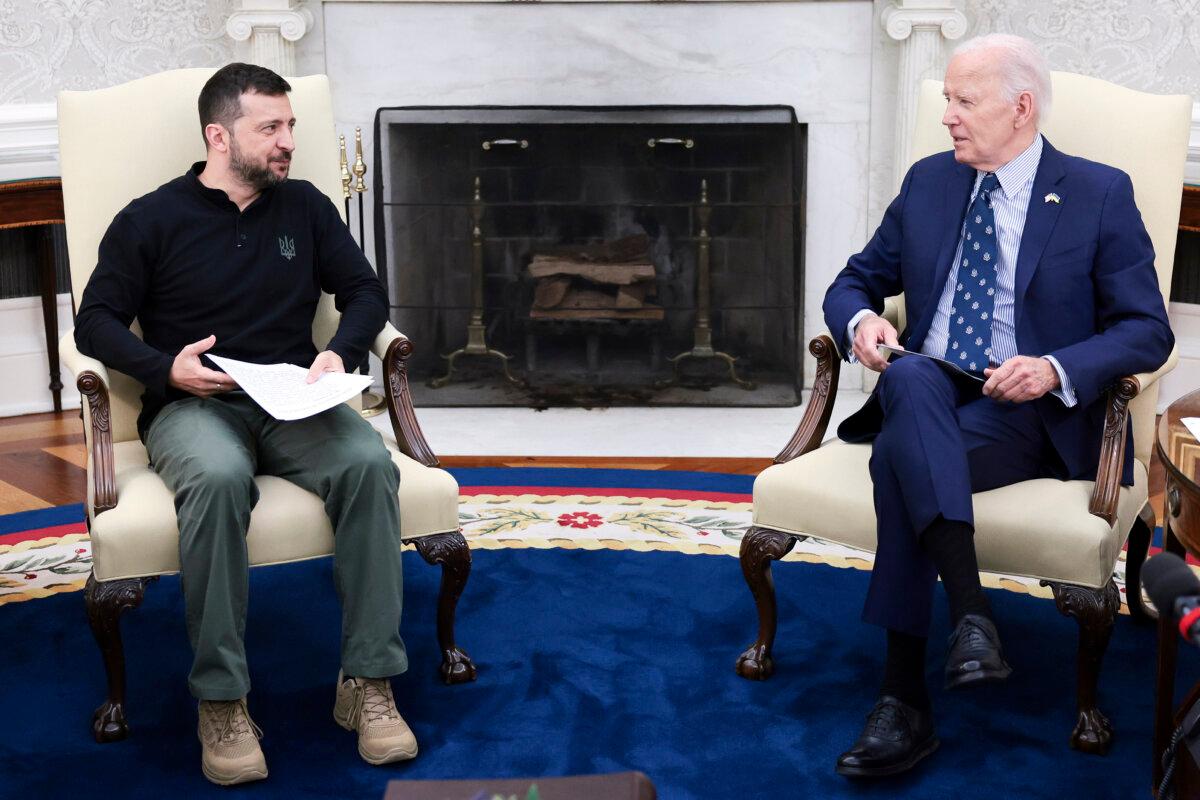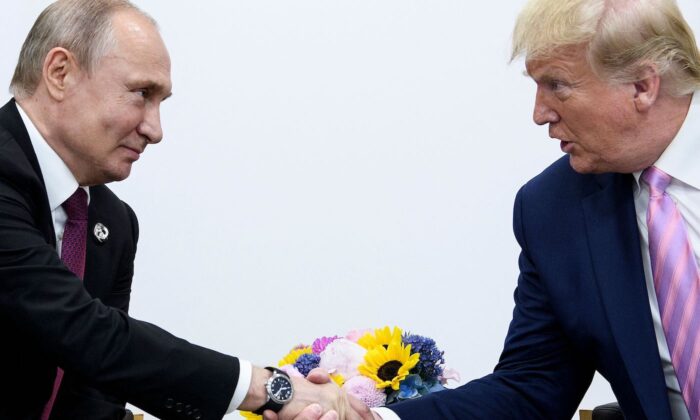Relations with Moscow—and the fate of Ukraine—take center stage as Trump gears up to return to the White House.
News Analysis
In the run-up to the U.S. election, former President Donald Trump pledged to quickly end the war in Ukraine. Now that he has secured a second term in office, speculation is rife as to how he intends to do so.
The conflict will have been ongoing for almost three years when Trump returns to the White House on Jan. 20, 2025.
Francis Boyle, a foreign policy analyst, points to recent comments made by Sen. JD Vance (R-Ohio), Trump’s running mate, which suggest “potential outlines” for a negotiated solution.
“I suspect Vance coordinated those comments with Trump,” Boyle, a professor of international law at the University of Illinois College of Law, told The Epoch Times.
Speaking on the Shawn Ryan Show podcast in September, Vance suggested that a “demilitarized zone” could be established between the warring sides.
He did not provide further detail about the proposed demilitarized zone, or its precise geographical location, other than to say it should be “heavily fortified.”
Russia, meanwhile, according to Vance, would receive a “guarantee of neutrality” from Kyiv, meaning that Ukraine would abandon its bid to join the NATO alliance.
“That is ultimately what the deal is going to look like,” the vice presidential candidate said at the time.
Moscow Open to Talks
Following Trump’s electoral win, Kremlin spokesman Dmitry Peskov said that Russian President Vladimir Putin was prepared to hold “constructive dialogue” about Ukraine with the incoming U.S. administration.
“Let’s wait and see what happens [when Trump takes office] in January,” Peskov said, as reported by state media. He said Moscow will draw its conclusions based on Trump’s “first concrete steps” as president.
Russia’s foreign ministry, meanwhile, said that Moscow will continue to defend its “national interests”—regardless of who occupies the White House.
“Russia will work with the new [U.S.] administration … by firmly defending its national interests and staying focused on achieving all goals set in the special military operation,” the ministry said in a Nov. 6 statement.
“Our terms have not changed and are well known in Washington,” it added.
In 2022—two years after the end of Trump’s first term—Russia invaded and effectively annexed large swathes of eastern and southeastern Ukraine.
Since then, the United States has remained among Ukraine’s staunchest supporters, providing Kyiv with a vast array of military hardware—and billions of dollars—to stave off the Russian invasion.

As articulated by Putin, Moscow’s terms for ending the conflict include the withdrawal of Ukrainian forces from all territories claimed by Russia, along with written guarantees that Ukraine would permanently stay out of NATO.
Kyiv, however, has vehemently rejected these terms, and has vowed to continue fighting Russia for the recovery of all lost territories.
Speaking in Budapest on Nov. 7, Ukrainian President Volodymyr Zelenskyy said that any concessions to Russia—territorial or otherwise—were “unacceptable.”
“There has been much talk about the need to yield to Putin … to make some concessions,” Zelenskyy said, according to local media. He went on to say that such an outcome is “unacceptable for Ukraine, and suicidal for all Europe.”
Despite Kyiv’s adamant stance, Russian Foreign Minister Sergey Lavrov has voiced Moscow’s willingness to listen to “any proposals” tabled by Trump and his foreign policy team.
“If there is an initiative to sit down and have a frank conversation about where we stand and how we should move forward—without any unilateral demands—we will be ready for that,” Lavrov told reporters on Nov. 7.
On the same day, Putin congratulated Trump on his electoral win and signaled his readiness to negotiate.
“What has been said [by Trump] about the desire to restore relations with Russia [and] contribute to the end of the Ukrainian crisis … deserves attention,” Putin said at a high-profile forum in the Russian city of Sochi.
Trump appeared to reciprocate on Nov. 8, telling NBC News that he had not yet communicated with Putin, while adding: “I think we’ll speak.”

‘Eminently Negotiable’
Boyle believes Moscow is willing to make concessions—at least on some points—in order to secure a negotiated solution.
He cited a number of documents that he believes could form the basis for talks.
These include two Russian draft treaties from late 2021, which called—among other things—for a permanent ban on Ukrainian NATO membership.
In January 2022, NATO and Washington rejected the draft treaties, prompting Russia to launch its initial invasion of Ukraine the following month.
“Obviously, they [the two draft treaties] set forth the maximalist Russian position. But they were eminently negotiable,” Boyle said.
“Lavrov has always stated that the key factor is a commitment in writing that Ukraine cannot join NATO. I think that’s their bottom line—everything else can be negotiated or finessed,” he said.
“Putin also recently said he was prepared to go back to the Istanbul treaty,” Boyle said, referring to a Russia–Ukraine cease-fire agreement that was almost signed in March of 2022.
Some experts, however, view Trump’s pledge to end the conflict upon taking office as overly optimistic.
“It’s unrealistic to expect negotiations, at least for the first several months of the Trump administration,” Stanislav Aleksandrovich Pritchin, a Russian political analyst, told The Epoch Times.
“I don’t expect any progress, at least in the short term,” said Pritchin, who heads the Central Asia desk at Russia’s Institute of World Economy and International Relations.
Despite Putin’s stated willingness to negotiate, Pritchin said, there are “still uncertainties about the possibility of talks, especially with Zelenskyy’s team.”
Speaking to reporters on Nov. 8, Peskov, the Kremlin spokesman, echoed these sentiments, saying: “Nothing can resolve this issue so quickly.”
Nevertheless, Peskov commended Trump for “eyeing peace instead of conflict,” which, he said, the outgoing U.S. administration has been unwilling to do.
Boyle was more direct, saying the current administration in Washington is composed largely of “Russophobic warmongers.”
“I would think the Russians are pleased that the Democrats are out of power in the White House and Senate, and maybe the House,” he said.
Boyle went on to cite Article 33 of the U.N. Charter, which, he said, “requires negotiation as a legal obligation.”
According to Article 33, “the parties to any dispute, the continuance of which is likely to endanger … international peace and security, shall, first of all, seek a solution by negotiation … or other peaceful means of their own choice.”
While the Biden administration has made little secret of its disdain for Putin, Trump kept on good terms with the Russian leader during his first term in office.
Pritchin acknowledged that there had been “good personal relations between the two leaders.”
“But we didn’t see any progress in terms of U.S.–Russia relations because the U.S. political system—and Trump’s [first] administration—was full of radical politicians who espoused hardline positions against Russia,” he said.
In this regard, Pritchin drew a distinction between Trump’s approach to Moscow and “that of the [U.S.] political and administrative system,” particularly the defense and security establishment. The latter, Pritchin said, remains “opposed to any relations—or negotiations—with Russia.”
According to Boyle, diplomacy requires a good rapport between heads of state that “facilitates negotiations, even if they disagree with each other’s position.”
“Hopefully, this time, Trump will bring more reasonable people in the area of foreign affairs,” he said. “We’ll just have to see how he fills those slots.”

